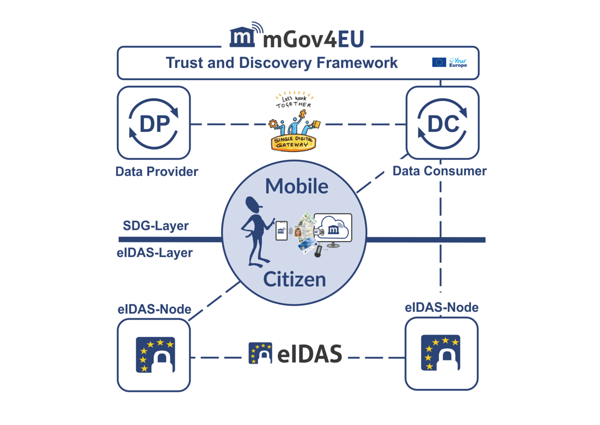mGov4EU project will enable user-centric mobile government services across Europe
The mGov4EU
project aims at the smooth and user-centric integration of two important
European regulations: While the regulation (EU) No. 910/2014, which is commonly known as “eIDAS-Regulation”, provides the
trustworthy foundation with respect to electronic identity and trust services,
the “Single Digital Gateway Regulation” (EU) 2018/1724 provides an additional layer, which
uses secure data exchange and electronic delivery facilities in order to enable
mobile cross-border government procedures.
The mission of the recently started mGov4EU project is to integrate eIDAS and SDGR in a way that not only fulfils privacy and security requirements, but also aims at an excellent user experience when consuming complex services using constrained mobile devices. Innovating mobile identity and consent management, as well as the trustworthy management and exchange of electronic data and verifiable credentials across borders, are key aspects of this exciting project. mGov4EU will conduct basic research in order to provide a solid foundation for the design and implementation, as well as the piloting and evaluation of innovative components and services which enable secure mobile government services for Europe. This is accomplished by combining and enhancing the existing eIDAS Layer and the emerging SDGR Layer with innovative components and services, which can be used on mobile devices across borders. mGov4EU will provide a trustworthy federation of collaborative platforms that facilitates co-delivery, reuse, and trustworthy provision of accessible and easy-to-use public services. The project will practically implement the once-only, digital-by-default, and mobile-first principles in a user-centric manner in order to support and complement the practical implementation of the eIDAS and the Single Digital Gateway Regulations.
During the three-year project period, several mGov4EU pilot applications will be designed and implemented to validate the enhanced infrastructure services. These applications are e.g., electronic voting, smart mobility, and mobile signing. Interested parties across Europe are heartily invited to contact the mGov4EU consortium to participate in these pilots and suggest innovative additional use cases related to mobile government services.
Interdisciplinary team of international experts from government, business, and science
The mGov4EU project assembles leading European experts from government, business and science located in Austria, Belgium, Estonia, Germany, and Spain, to enable secure and privacy-friendly mobile government services across Europe.
The project coordinator is TECHNIKON Forschungs- und Planungsgesellschaft mbH. The mGov4EU project is completely funded by the EU’s Horizon 2020 programme for research and innovation with an indicative budget of € 3.9 million and is executed by internationally acknowledged experts from Secure Information Technology Center Austria (A-SIT together with A-SIT Plus GmbH), Danube University Krems, ecsec GmbH, Fraunhofer-Gesellschaft zur Förderung der angewandten Forschung e.V., go.eIDAS Association, Graz University of Technology, Scytl Election Technologies, TIMELEX and University of Tartu.
The mGov4EU consortium invites all organisations and individuals interested in developing an open ecosystem for secure mobile government services to join the mGov4EU initiative.


Comments